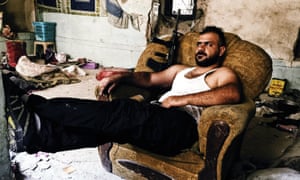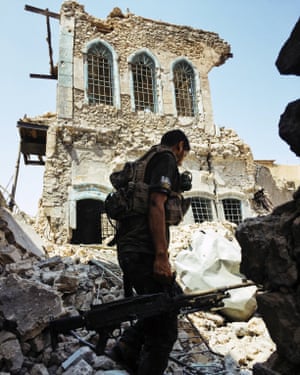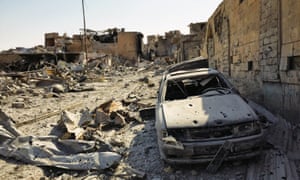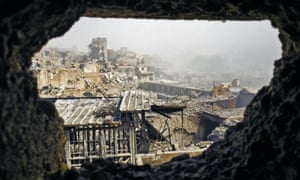Hunt for Isis fighters goes on despite declaration of victory in Mosul | World news
Days after Iraq’s prime minister, Haider al-Abadi, declared victory over Islamic State forces in Mosul, emaciated figures were still emerging from tunnels and basements in the shattered city on Wednesday: old men carried on the backs of their sons and women wearing dusty, tattered abayas, dragging behind them their parched and thirsty children.
In the shadow of what had once been the city’s 12th century al-Nuri mosque, blown up by Isis fighters last month in the final, desperate days of battle, a special forces officer pointed at the families who were limping out of the ruins without a male relative.
“Those are all Daesh,†he said. “The old city is where the fighters brought the loyalist families, but what can we do?â€
Two injured young men, both of military age, were detained on the spot, despite the pleading of their families. “I swear he was injured by a sniper when he went to get water from the river,†said a young woman, pointing at a man who had a long, fresh scar in his abdomen.
Almost three years after the Isis leader Abu Bakr al-Baghdadi declared a caliphate in the northern Iraqi city from the steps of the now ruined mosque, its “terrorist state†has at last collapsed, Abadi said on a visit on Sunday.

Even after he spoke, however, fighting continued in a handful of alleyways of Mosul’s old city, where the last, desperate remnants of the Isis resistance were trapped.
For nine months, Iraqi soldiers and special forces units were locked in battle to capture the city, but the last weeks of urban combat through the old district, with its narrow alleyways, stone houses and webs of connected basements and tunnels, proved the most difficult of all.
“In three years of fighting Isis we have seen so much and suffered many losses, but nothing we have seen can compare to the last couple of weeks here in the old city,†said Brigadier-General Flah, chief of staff of the Iraqi Special Operation Forces.
In these tangled streets, where there was no fixed front line and no safe areas, it was the civilians who bore the brunt. Here, the care that the Iraqi forces largely took elsewhere to save the lives of civilians disappeared. When advancing soldiers faced resistance, air support was called in, and the subsequent aerial bombardment shattered much of the city, along with its inhabitants.

A report by Amnesty International, published on Tuesday, accused Isis of deliberately trapping civilians to use as human shields, and the government forces and their coalition allies of using imprecise explosive weapons, potentially committing war crimes, in response. The British deputy commander of the anti-Isis coalition dismissed the report on Wednesday as “deeply irresponsibleâ€.
Inside a church, tired soldiers rested against thick pink columns as shafts of light shining through the partially collapsed vaulted roof illuminated a floor strewn with debris, weapons and discarded meals.
Some of the soldiers collected their gear and weapons and headed out to continue searching their sector for any jihadists still hiding in basements and tunnels.

To do so, they were forced to climb over concrete boulders, chunks of stone masonry and twisted shop shutters. Air strikes have levelled entire buildings, digging deep craters and forcing up huge mounds of earth and debris, even placing the skeletons of cars on rooftops.
So complete is the destruction that in some places only a few traces remain of the building that once stood there: a door; a window frame; a flipped, broken sofa â€" all coloured grey by ash. The dead litter the area, and over everything hangs the putrid smell of decomposing bodies, excrement and rotting food.
Through a small opening in a wall, the soldiers climbed into a room filled with colourful bras and underwear. They stepped over the mutilated body of a fighter whose leg hung from the wheels of a motorbike, then crossed a small street lined with collapsed buildings, zigzagging between the bodies of two more dead fighters.

In the final week of fighting, the daily advance was measured in metres, with soldiers and jihadists frequently in the same buildings, lobbing grenades and homemade bombs at each other through openings in the walls.
One of the soldiers, Staff Sergeant Walaa, pointed at a house where only a single room was still standing. “Two suicide bombers attacked us here â€" one of them came running with crutches.†Four others had blown themselves up around the corner, he said. In a war in which no prisoners were taken, the trapped jihadists had strapped themselves in suicide vests and waited for the advancing soldiers.
One of the injured Isis fighters had detonated his vest two days earlier in a building that, until then, had been a field hospital. On its burned ground floor, his charcoal body lay, frozen at the moment of agonising death, with only his teeth still white in the blackened room.

The soldiers threw grenades into basement entrances before sealing them, then climbed into a still-smouldering building on the edge of the old city. Through its shattered facade, they looked out at a panorama of Mosul: its now collapsed commercial streets, the broken steel bridge, and the blue, flowing river Tigris.
One desperate Isis sniper fired at a platoon of federal police stationed at the mouth of the bridge, pinning the men behind their armoured vehicles as the bullets smacked into its side with a twang.
Then a jet fighter descended, a rocket screeched, and there was an explosion. A white plume of smoke rose into the sky. Another fighter silenced.

0 Response to "Hunt for Isis fighters goes on despite declaration of victory in Mosul | World news"
Posting Komentar